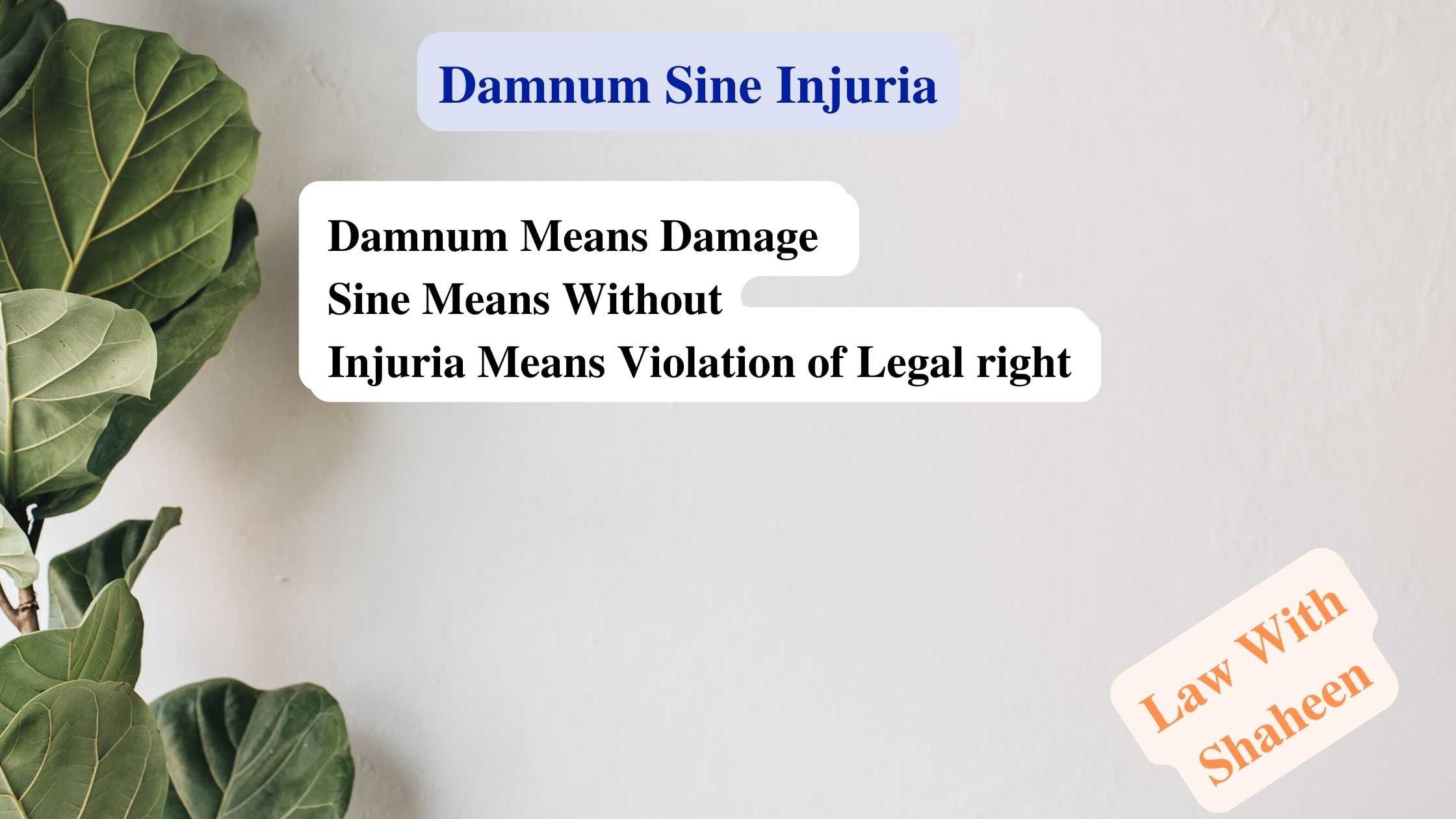Table of Contents
Meaning of Damnum Sine Injuria:
The word ‘Damnum’ means ‘Damage’. The word ‘sine’ means ‘without’. And the word ‘injuria’ means ‘violation of legal right’. Thus, Damnum sine lnjuria i.e. actual and substantial loss without infringement of legal right.
Explanation:
According to this maxim proof of damage however heavy would not be actionable as a Tort in the absence of proof of violation of legal right.
According to Salmond; there are many acts that though harmful are not wrongful and give no right of action to those who suffer their effects. Thus, the maxim means that infringement of legal right will give rise to an action irrespective of the fact that no actual loss or damage has taken place.
Thus, in cases of assault, battery, false imprisonment, libel, trespass on land, etc., the mere wrongful act is actionable without proof of special damage. The court is bound to award to the plaintiff at least nominal damages if no actual damage is proved. This principle was firmly established by the election case of Ashby v. White.
Leading case: Mayor of Bradford v/s Pickles (1895).
Facts: in this case, Bradford Corporation (Plaintiff) passed a resolution to expand its water reservoir system and for this purpose, they entered into negotiations with Pickles (defendant) to purchase his land. The defendant demanded a very highly inflated price for his land.
The plaintiff abandoned the idea to purchase the land of the defendant. Thereafter, the defendant excavated on his own land and abstracted the flow of water towards the water reservoir of the plaintiff. Because of the diminished supply of water as a result of obstruction, the water reservoir becomes empty of water.
The plaintiff had to suffer a big loss to make alternate arrangements for the supply of water to the citizens of Bradford. This loss and malice of the defendant was made basis of tortuous action by the plaintiff against the defendant.
Held:
In this case, the House of Lords dismissed the case of the plaintiff and laid down the following two principles on the application of this maxim;
i) Proof of Damage would not be actionable as a Tortious wrong in the absence of proof of violation of a legal right, because The maxim is “Damnum sine injuria”.
ii) When something has been done in the exercise of legal right, the circumstance That the right has been exercised maliciously would not make a person liable under the law of Tort.
Instances of Damnum sine injuria:
i). Case Law: Gloucester Grammar School case:
Remarks: in this case Hank Ford J, remarked that where the plaintiff suffered the loss of fees. Because the defendant, a plaintiff, and a schoolmaster, set up a rival school next door to the plaintiff’s, and boys from the plaintiff’s school flocked to the defendant.
Held:
In this case, it was held that no action lay. Thus, if there is no infringement of any legal right, legal competition is no ground For an action.
ii). Case Law: Ratting Municipal Committee of Lahore.
Facts: in this case defendant, the Lahore Municipality built a slaughterhouse near the plaintiff’s house and the value of the plaintiff’s house was thereby dismissed.
Held:
In this case, it was held that the act causing the damage was lawful. Therefore, it was not actionable.
iii). Case Law: Brom v/s Richie:
Facts: in this case the defendant had published a defamatory statement against the deceased, the father of the plaintiff, causing the latter, the plaintiff, to be cut off from all decent society.
Held:
In this case, it was decided that there was no infringement of any legal right. A man has a right to his own reputation, but not to his father’s reputation. Therefore, no legal action could be taken.
iv). Case Law: Clark v/s London General Omnibus Co.
Facts: the plaintiff, a widow, suffered damage on account of the death of her husband caused by the defendant’s negligence.
Held:
In this case, the defendant was not held responsible for the damage to the plaintiff because the defendant did not violate any of the plaintiff’s legal rights.
